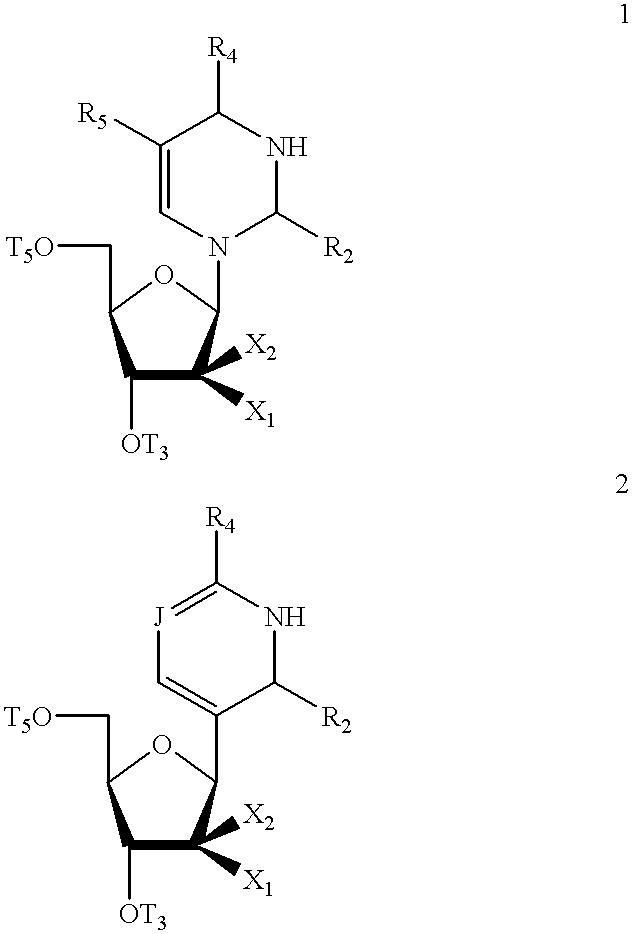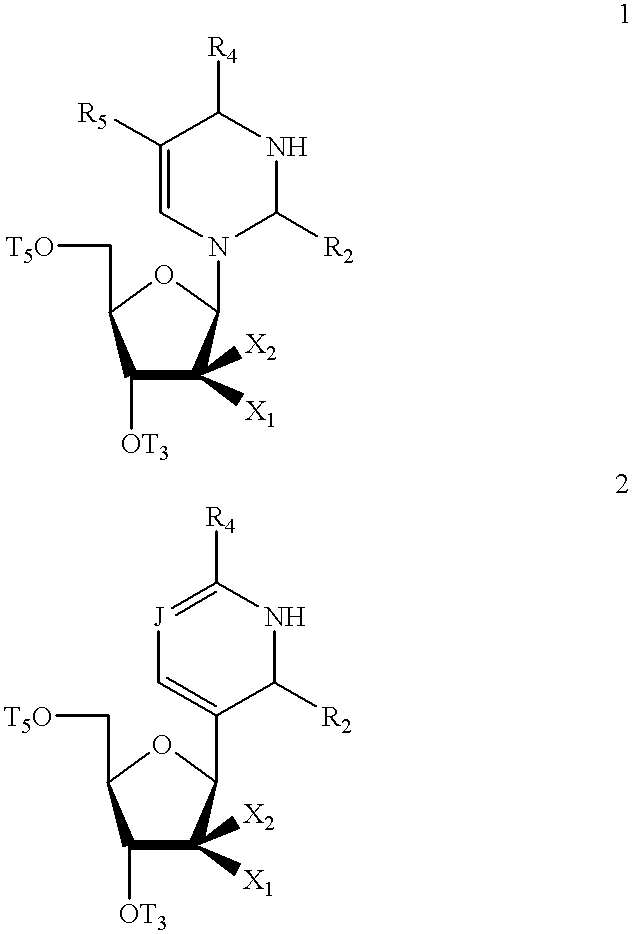Pyrimidine nucleosides
a nucleoside and pyrimidine technology, applied in the field of oligonucleotides, can solve the problems of b) and () that the nucleosides having 2-n-alkyl groups at these positions cannot meet the criteria of b) and ()
- Summary
- Abstract
- Description
- Claims
- Application Information
AI Technical Summary
Benefits of technology
Problems solved by technology
Method used
Image
Examples
example 1
4-Chloro-2-trimethylsilylethoxy-pyrimidine, 12
A solution of trimethylsilylethanol (10 g, 85 mmol) in 30 mL anhydrous THF was cooled to -68.degree. C. in a dry ice / isopropanol bath. A solution of n-butyl lithium (33.8 mL, 2.5 M in THF) was added dropwise over 15 min. The solution was stirred for 10 min at this temperature and then added to a solution of 2,4-dichloropyrimidine (12.62 g. 85 mmol) in 75 mL THF at -35 to -25.degree. C. The final yellowish solution was allowed to come to room temperature under an argon atmosphere then stirred at this temperature for 1 hr. This solution was diluted with 200 mL of diethylether and washed with cold water (100 mL), saturated NaHCO.sub.3 (100 mL) and brine, then dried over MgSO.sub.4, filtered and evaporated to yield a tan syrup. This syrup may be crystallized from hexanes at -60.degree. C. to yield 12 as a light yellow solid, 17.8 g (91%). .sup.1 H-NMR (CDCl.sub.3): .beta.8.36 (d, 1H, H-6); 6.93 (d, 1H, 5-H); 4.43 and 1.17 (t,t; 4H; CH.sub.2 ...
example 2
4-Chloro-1-(2, 3,5-tri-O-benzoyl-.beta.-D-ribofuranosyl)pyrimidin-2-one, 13
A solution of 12 (8.17 g. 35.4 mmol) in 200 mL anhydrous acetonitrile is treated with 1-O-acetyl-2,3,5-tri-O-benzoyl-D-ribofuranose (Pfanstiehl) at room temperature and under an atmosphere of argon. To this mixture is added TMS-triflate (6.11 mL, 35.4 mmol) and the mixture stirred at this temperature for 2 hr. Evaporation of the solvents in vacuo yielded an amber syrup which was immediately redissolved in 300 mL CH.sub.2 Cl.sub.2, washed with cold, saturated NaHCO.sub.3 (2.times.150 mL), dried over magnesium sulfate, filtered and evaporated to a tan residue. Trituration of this residue with cold, anhydrous acetonitrile yielded analytically pure 13, 14.4 g (71%). .sup.1 H-NMR (DMSO-d.sub.6): .beta.8.39 (d, 1H, 6-H, J.sub.6,5 =11.8 Hz); 8.0-7.4 (m, 15H, aromatic); 6.68 (d, 1H, H-5); 6.11 (d, 1H, H-1', J1,2=2 Hz); 5.95 (m, 2H, H-2',3'); 4.85 (m, 1H, H-4'); 4.70 (m, 2H, H-5',5"). Anal. Calcd for C.sub.30 H.sub.23...
example 3
4-(1-Hexyn-1-yl)-1-(2,3,5-tri-O-benzoyl-.beta.-D-ribofuranosyl)pyrimidin-2- one, 14a.
A suspension of bis-triphenylphosphine palladium (II) dichloride (0.35 g, 0.5 mmol) and copper (I) iodide (95 mg, 0.5 mmol) in THF (45 mL, distilled from Na-benzophenone ketyl) is sparged with dry argon gas for 10 min. To this suspension is added 1-hexyne (2.46 g, 30 mmol) followed by triethylamine (5 mL). The suspension is stirred at room temperature under argon for 15 min. A similarly sparged solution of the 2-chloro-1-(2,3,5-tri-O-benzoyl-b-D-ribofuranosyl)pyrimidin-4-one (13, 5.75 g, 10 mmol) in THF (15 mL) is added to the suspension of catalyst and the mixture stirred for 1 hr. The dark mixture is filtered through Celite and the filtrate evaporated in vacuo to afford a dark syrup. This syrup was triturated with cold diethylether, filtered and then dissolved in dichloromethane. The solution is washed with cold 1 N HCl, dried over magnesium sulfate and again evaporated in vacuo. The resulting res...
PUM
| Property | Measurement | Unit |
|---|---|---|
| temperature | aaaaa | aaaaa |
| temperature | aaaaa | aaaaa |
| temperature | aaaaa | aaaaa |
Abstract
Description
Claims
Application Information
 Login to View More
Login to View More - R&D
- Intellectual Property
- Life Sciences
- Materials
- Tech Scout
- Unparalleled Data Quality
- Higher Quality Content
- 60% Fewer Hallucinations
Browse by: Latest US Patents, China's latest patents, Technical Efficacy Thesaurus, Application Domain, Technology Topic, Popular Technical Reports.
© 2025 PatSnap. All rights reserved.Legal|Privacy policy|Modern Slavery Act Transparency Statement|Sitemap|About US| Contact US: help@patsnap.com



